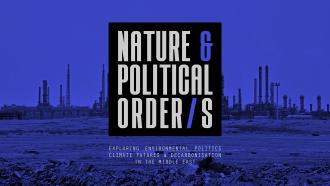Call for Papers: EWIS 2021 / Nature and Political Order(s)

Workshop Convenors: Cemal Burak Tansel (University of Sheffield) & Jan Wilkens (University of Hamburg)
Submission Deadline: 18 January 2021
Climate change and environmental politics became key issues in international politics due to pressure from various actors, such as social movements, civil society activists and indigenous peoples. It is, therefore, of little surprise that the concept of justice constitutes a central reference both in academic debates about climate politics and at different levels of global governance in which environmental and climate regimes are designed and justified. However, political dynamics highlight that neither ideal theories of justice based on Western scholarship nor claims to ‘just solutions’ in global governance relate to the social realities of actors and communities severely affected by environmental degradation and climate breakdown. Two major problems that arise from this dissonance can be summarised as ‘Justice for whom?’ and ‘Justice on which ontological and epistemological grounds?’.
We contend that much of the relevant academic contributions in IR and IPE remain within a state-centric ontology, which neglects diverse ways of knowing, and ignores competing perspectives advanced by non-state actors. Further, a narrow focus on the popularity of climate and environmental activism in the global North has resulted in the sidelining of a longer lineage of Southern activism against environmental exploitation and ‘green colonialism’. Concurrently, dominant notions of justice—for example, in global climate governance—are based on colonial and capitalist ontologies and epistemologies, which assume human–nature binaries in ways that justify existing modes of production, resource extraction and authoritarian political orders. Hence, treating nature and climate change simply as further ‘policy fields’ and governance issues is highly problematic in analytical and normative terms.
Against this background, the Middle East and North Africa constitutes a crucial mobilisation space in which assumptions about energy transition, resource exploitation and contesting notions of just futures shape political struggles. These dynamics transform interventions, imaginations, and political relations in and between the local, regional and global scale. This workshop seeks to advance theoretical debates in IR, IPE and environmental and climate research by focusing on the politics in the region. We seek to explore:
- How is nature related to the questions of political economy in the region?
- How do international calls for decarbonisation interact with authoritarian state power?
- How do notions of ‘climate justice’ in global climate governance support or undermine local and regional activism?
- How does knowledge production on climate and environmental issues reproduce colonial narratives, power structures and existing regional and global order(s)?
- How do the emerging pathways of energy transition in the region shape existing conflicts and social struggles?
- Does environmental and climate activism constitute an opportunity to achieve alternative political configurations?
To this end, the workshop brings together scholars focusing on the diverse implications of nature, environmental politics and climate change in and for the Middle East. The aim is to discuss recent dynamics in the region, to critically reflect on existing assumptions and to better understand nature as a constitutive factor in regional and global politics.
Please submit your abstracts via the EWIS electronic submission system and send a copy to the workshop convenors Cemal Burak Tansel (University of Sheffield) & Jan Wilkens (University of Hamburg) by 18 January 2021. Successful participants will be informed by 22 February 2021.
For more information, please visit the EWIS 2021 website.